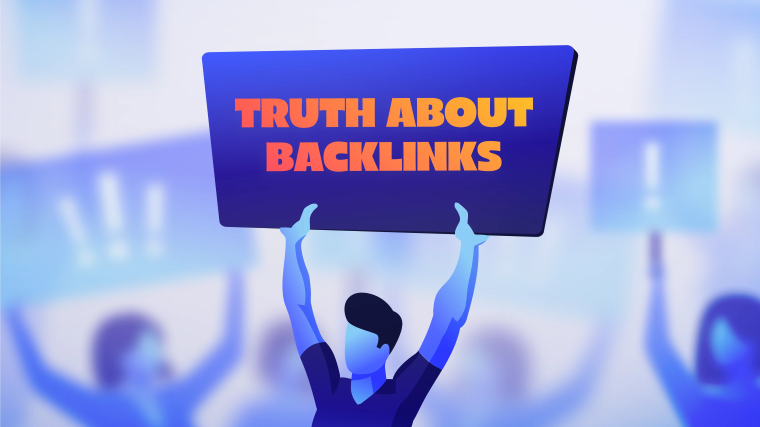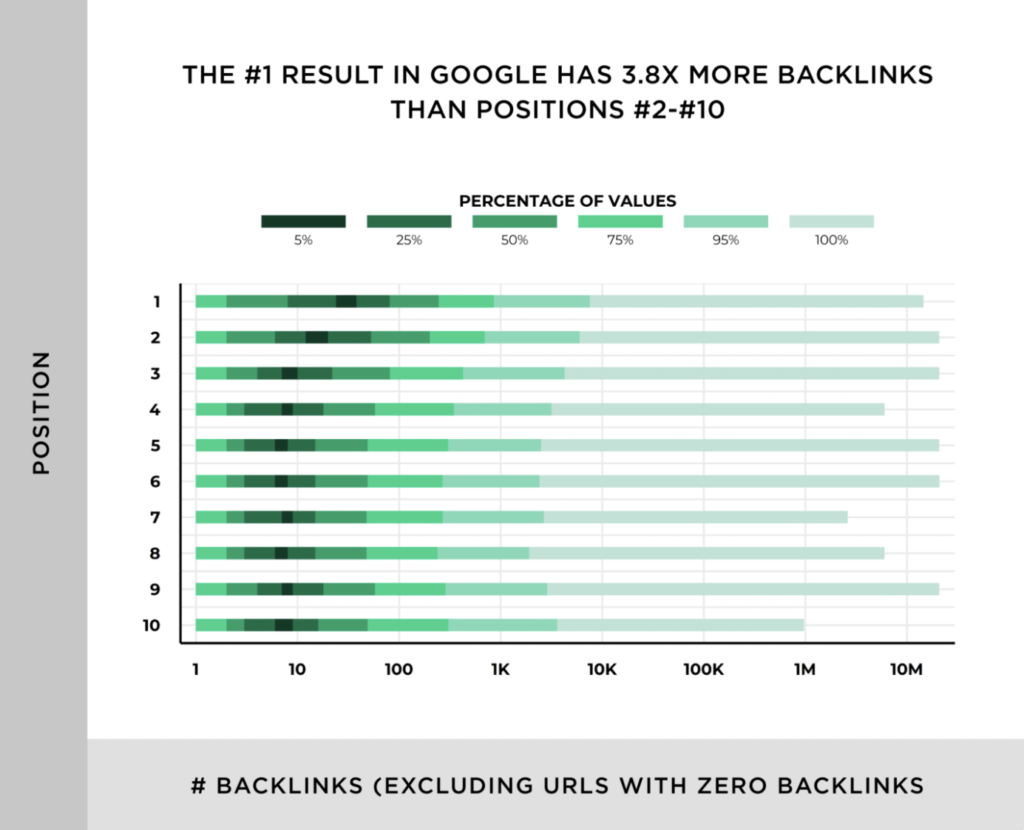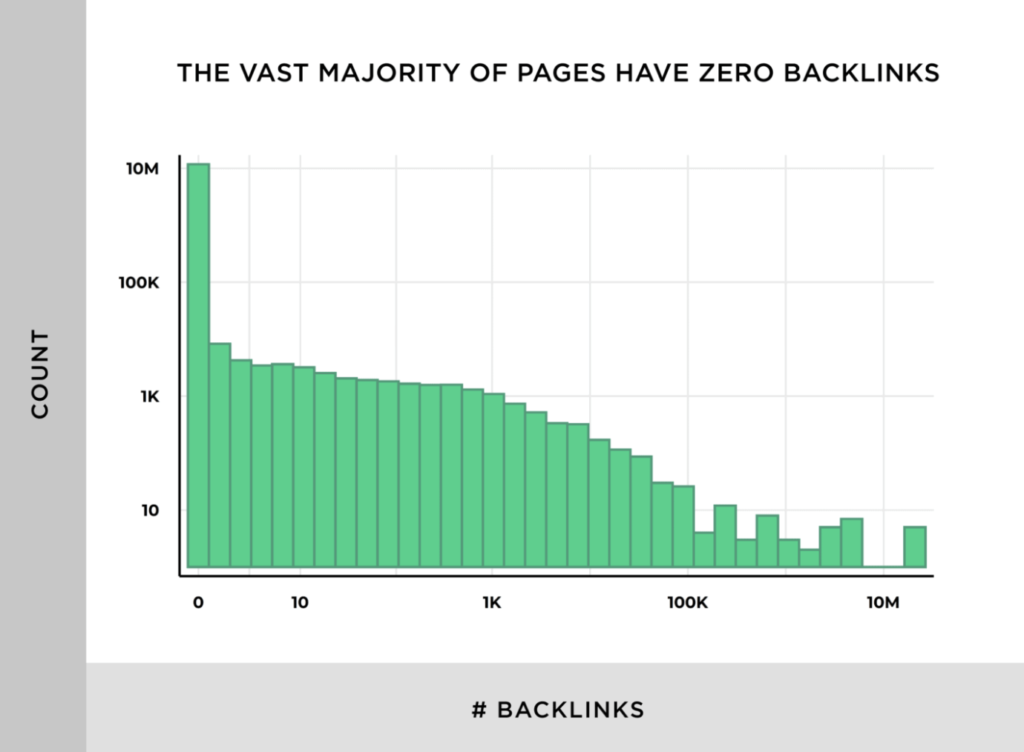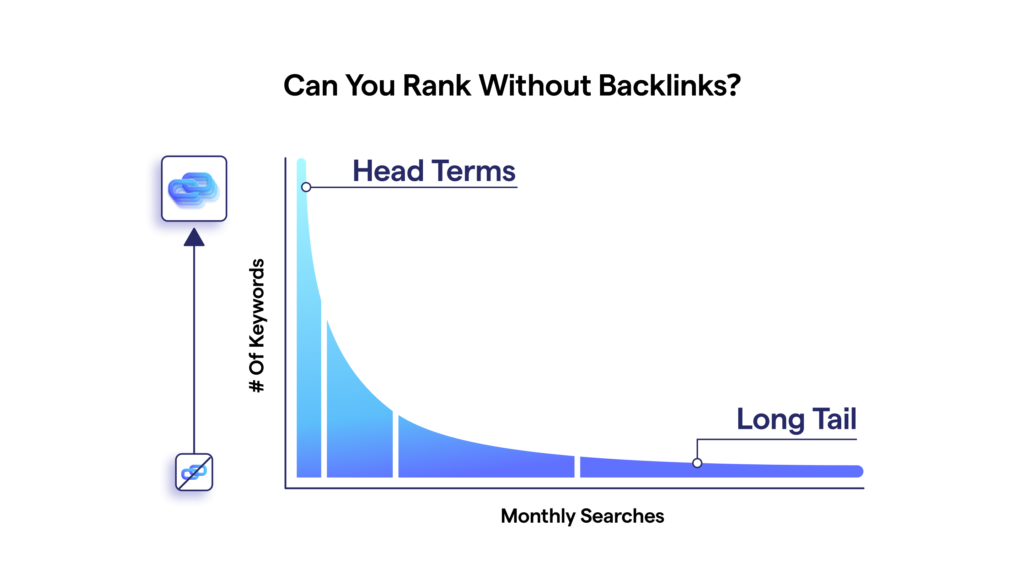
Here’s the deal: The truth about backlinks is that they are essential for SEO. They act as a vote of confidence in your website’s content and authority, which helps search engines rank you higher on search engine results pages (SERPs).
When contextually relevant content links back to your page, search engines like Google know that your site is a valuable source of that information. In turn, their algorithms will put you in front of more of their users.
But building backlinks ain’t easy! It takes time to build quality links that not only benefit your site but don’t get you penalized by Google or any other search engine.
At Linkflow, we don’t just talk the talk—we walk the walk. That’s why we’ve put together this comprehensive guide to the truth about backlinks for SEO.
Do Backlinks Still Matter?
One of the most common myths about backlinks is that you don’t need them anymore.
Backlinks are the core of Google’s original PageRank algorithm, and they remain an essential part of search engine optimization. Numerous studies point to the fact that backlinks are still a major ranking factor, and it’s likely to remain a key component of SEO for years to come.

Backlinko analyzed 11.8 million search results and found that the number one position had 3.8x more backlinks than the 2-10 spots.

Interestingly, another study conducted by Backlinko and BuzzSumo found that out of 912 million blog posts, 94% had zero backlinks. This could be because most people fail to properly optimize their content with backlinks and other SEO strategies.
When those data points are excluded, the top position for each keyword always had more backlinks than lower-ranking spots.
Link Quality vs. Quantity: Which Matters More?
When it comes to building backlinks, many people think that quantity is the most important. After all, more links should equal better SEO results, right?
Not exactly. If you send too many low-quality links to your site, this can work but it’s short lived. Eventually, your rankings will bomb.
Links from sites with high authority (e.g., major news outlets and respected industry publications) are more valuable but are much more difficult to secure.
In a perfect world, you’d want a high number of high-quality links. However, perfection is the enemy of productivity. Outreach is unpredictable and rather than obsess over hard to obtain links, you have to develop your own minimum acceptable criteria.
For example, here’s what we use:
- Real Websites
- Relevant to your industry
- DR40+
- Domain traffic above 1000
- Domain traffic that isn’t on a downward trend
If it checks off all the boxes, it’s considered a high-quality link.
Point these backlinks to the right pages and you should be on your way to achieving your business objectives.
The key takeaway? Don’t get too hung up on the overall number of links you have—focus on building quality backlinks that meet your minimum criteria, are relevant to your industry and take incremental steps toward improving your search engine rankings.
How Do Backlinks Help With SEO?
It’s essential to understand the role they play in a modern marketing strategy. Let’s examine the benefits of backlinks to help you understand why they are important for SEO.
1. Improved visibility on SERPs
The primary benefit of backlinks is increased visibility on SERPs. As mentioned, when search engines recognize that your website has been linked to from credible web pages with good content, you have the opportunity to rank higher for specific keywords and phrases that your customers or audience are searching for.
2. Increased referral traffic
Not only do backlinks help boost your visibility in search engine results pages, but they can also refer traffic to your website.
When people click on a link that takes them to your site, it adds an additional layer of trust for your brand and can result in more conversions or sales. This isn’t the primary objective of building links but more of an indirect benefit that can happen.
3. Greater brand awareness
The more backlinks you have pointing to your website, the more visible and authoritative you appear. Especially if you earn links from or write guest blogs for reputable editorial sites, the level of exposure you can receive can be tremendous.
4. Better targeting
When Google learns exactly where to rank each piece of content and in what context, it can make sure that your website is listed for relevant search terms. With quality backlinks, you can also focus on targeting more specific topics and keywords—all of which will help you reach the people that can make you money.
5. More sales, leads, and conversions
Assuming your landing pages are conversion-driven, your on-page SEO is up to par, and you engage your audience with quality content, the uptick in targeted traffic will result in more conversions, leads, and sales.
6. Long-lasting results
SEO is a long-term play. When you run PPC ads, you’re spending money today to get visitors tomorrow. But when you build the foundation of your online presence with backlinks, you’re investing in the future—with potentially long-lasting benefits.
How Much Should I Focus on Backlinks?
Backlinks are a critical part of any SEO strategy, but they aren’t the only part.
Other critical components of SEO include:
- On-Page SEO: Optimizing content and webpages for organic search
- Technical SEO: Improving the structure of your website to make it easier for search engines to crawl
- Local SEO: Targeting local customers with localized content (for local business owners)
- Content Creation and Optimization: Creating content that your audience would find helpful or interesting
- User Experience: Ensuring that customers have a positive experience when they visit your website
- Social Media: Increasing brand awareness and engagement through social media channels (not directly related to SEO, but can help it nonetheless)
While backlinks are an essential part of SEO, they are only one piece of the puzzle. If you want to achieve optimal results for your website and business goals, then you should create a comprehensive SEO strategy that considers all of these elements.
How much you should focus on backlinks will depend on a few factors:
The number of links you already earn from external sources
- Your current website authority and domain rating
- The amount of time you have to devote to building backlinks
- The level of success you have with other channels (such as content and social media).
To stay competitive, backlinks should be part of your overall marketing strategy. Depending on the other elements you’re focusing on, it may be a good idea to spend more or less time building high-quality links to your website.
Can You Rank on Google Without Backlinks?

Yes. You can rank for an infinite number of keywords without any backlinks at all. However, you won’t have the same visibility in organic search as those who invest time and energy into building quality links.
A good portion of the keywords you’ll rank for without backlinks will be long-tail keywords with low search volume.
Although it’s possible to rank on Google without backlinks, it’s certainly not easy—especially if your competitors are actively building backlinks. And if you want to rank for high-volume keywords, then you don’t stand a chance unless you focus heavily on link building.
Google Penguin Algorithm And Low Quality Links
Google’s Penguin Algorithm is one of the most important algorithms for SEO. It’s designed to detect and punish websites that are manipulating the search engine with low-quality backlinks, keyword stuffing, and other black hat SEO tactics.
In the past, SEOs used these techniques to game the system and get quick results. Now, those same tactics can actually hurt your website’s rankings and put you at risk of being penalized by the algorithm. At the very least, they won’t bring you any value for your link building efforts.
Everyone's reaction when low quality and spammy content is not indexed anymore pic.twitter.com/QU8S2nCupb
— Gary 鯨理/경리 Illyes (so official, trust me) (@methode) January 22, 2020
Even though the Penguin Algorithm was developed in response to black hat SEO techniques, it is also advanced enough to detect spammy links. Because it can detect them so well, most of them are not indexed by Google.
How Do You Remove Toxic Backlinks?
Toxic backlinks are links that come from websites with a poor reputation, link farms, pornographic sites, or spam directories and forums. In some cases, these links can be predatory in nature, and if someone is deliberately attacking your link profile, it could hurt your presence both online and off.
If your website has been negatively impacted by toxic backlinks, then you can take the following steps to remove them:
- Identify the toxic links: Use a tool like Ahrefs or Majestic SEO to identify any toxic links pointing to your website.
- Reach out to webmasters: Once you have identified the toxic links, reach out to the webmasters and request for them to remove your link.
- Use the Google Disavow Tool: If you can’t get the link removed manually, then use the Google Disavow Tool to have them disavowed and ignored by search engines.
As we mentioned earlier, Google typically ignores these types of links anyway, so taking action against them is usually unnecessary. The only time you should be worried about toxic links is if they are deliberately inserted with malicious intent.
Google even warns against using the Disavow Tool, stating that it should only be used as a last resort.
Bad Backlinks are Devalued, Not Penalized
At the end of the day, it’s important to remember that bad backlinks won’t necessarily hurt your website if you take action against them. Google is smart enough to detect spammy links and devalue them instead of penalizing the owner.
When using link building services, choose a provider that uses white hat link building techniques, understands your niche and unique business goals, and connects your content with authoritative websites in your industry.
Need More High-Quality Backlinks?
Well, don’t we all?
Backlinks remain a vital part of SEO, and if you want to get the most out of your link building efforts, then it’s essential that you focus on creating high-quality links. Quality backlinks can help boost your search engine rankings and increase visibility in organic search results.
If you’re serious about SEO, contact us to get started!

Nick Dyer, SEO Analyst
Nick started his SEO journey in 2017. Currently, he resides in Austin, TX. When it comes to his SEO experience, he’s worked with million dollar brands and builds his own affiliate websites in his spare time. One of his greatest passions is travel and trying new foods. He’s been to Italy, Spain, Australia, Greece and more.
